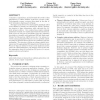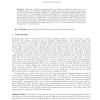96 search results - page 2 / 20 » Revealing Additional Information in Two-Party Computations |
IACR
2011
12 years 4 months ago
2011
Companies, organizations, and individuals often wish to share information to realize valuable social and economic goals. Unfortunately, privacy concerns often stand in the way of ...
CCS
2008
ACM
13 years 7 months ago
2008
ACM
We present FairplayMP (for "Fairplay Multi-Party"), a system for secure multi-party computation. Secure computation is one of the great achievements of modern cryptograp...
ASIACRYPT
2004
Springer
13 years 10 months ago
2004
Springer
Secret handshakes were recently introduced [BDS+ 03] to allow members of the same group to authenticate each other secretly, in the sense that someone who is not a group member ca...
EUROCRYPT
2004
Springer
13 years 10 months ago
2004
Springer
Informally, a public-key steganography protocol allows two parties, who have never met or exchanged a secret, to send hidden messages over a public channel so that an adversary can...
ICIS
2003
13 years 6 months ago
2003
Revelation policies in an e-marketplace differ in terms of the level of competitive information disseminated to participating sellers. Since sellers who repeatedly compete against...


